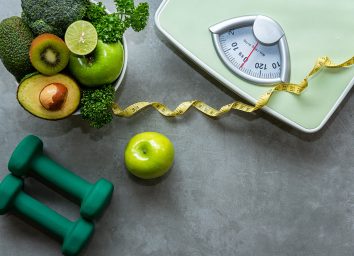When It Comes to Dieting, This Is the Most Toxic Belief
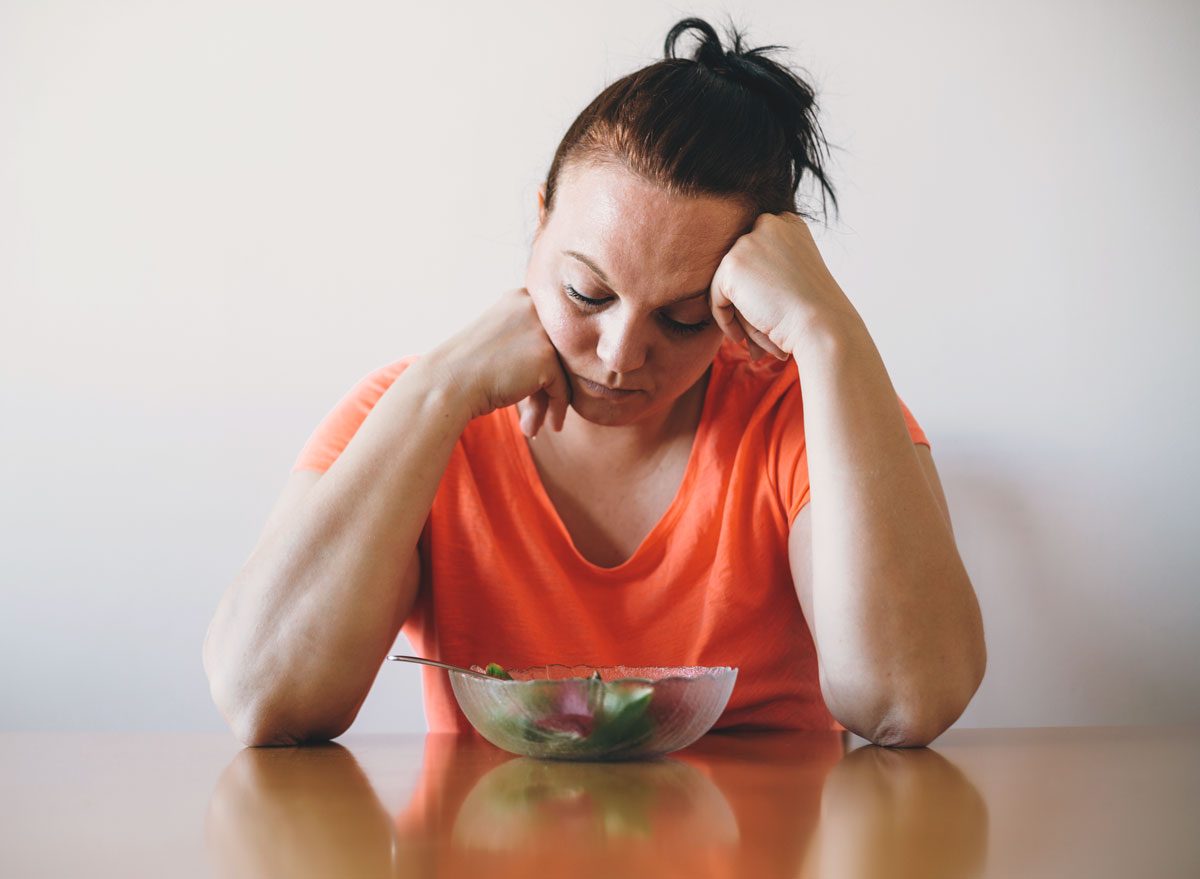
Let's just cut to the chase, shall we? The most toxic belief about dieting is dieting itself. Time and time again, the research shows that food restriction on a long-term scale has never worked for anyone's body. While the temporary effects of restricting food may seem promising, studies show that this type of dieting has never been sustainable for anyone. This is why it's important to understand how toxic diet culture is manipulating our chances to better our health.
To prove this point, we spoke with dietitians and doctors on why food restriction has never worked, and why you need to stop dieting immediately. Here's what they had to say, and when you're done reading and ready for a good meal, you should check out our list of 100 Easiest Recipes You Can Make.
Toxic diet culture messes with your physical health.
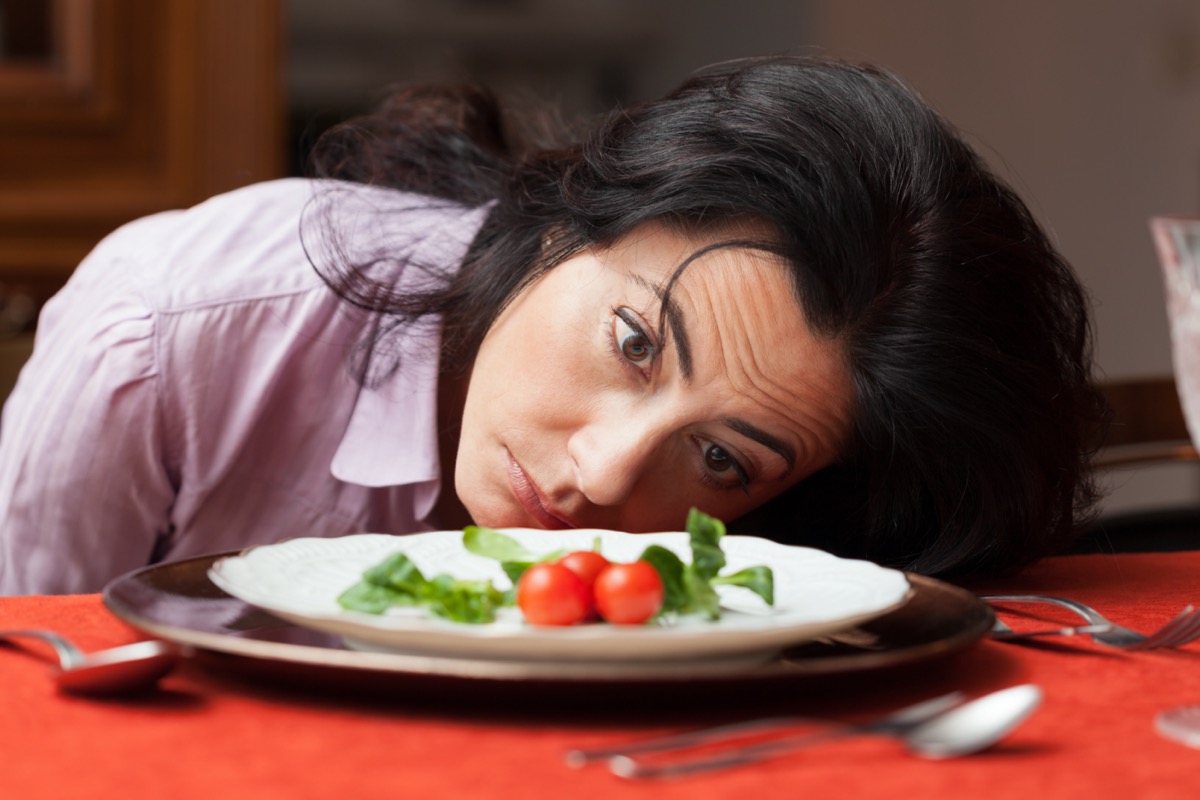
Although popular dieting programs have tried to make us believe that food restriction will result in better physical health (and maybe even a few pounds off that belly), the truth is food restriction actually does the opposite.
"Your body doesn't know the difference between self-imposed starvation and actual famine," says Lexy Penney, MS, RD, LDN, RYT, owner of Lexy Penney Nutrition and Wellness. "So when you restrict your diet (whether by amount or types of food) your body increases ghrelin (the hunger hormone) and decreases leptin (fullness hormone) so you end up feeling hungrier and finding it harder to feel complete fullness."
Think about it—how many times have you tried going on a diet, only to feel massively hungry at every waking moment? That's because your body is pumping out that hunger hormone because it's craving nutrients.
Plus, because your diet is in that "survival" mode, it's actually harder to lose weight because your body is trying to save some of that stored energy because it thinks it needs to in order to survive.
Here are the Dieting Habits That Are Shortening Your Life, According to Science.
Toxic diet culture messes with your mental health.

Your mental and physical health are a lot more connected than you think, and if you're not properly giving your body those nutrients, then your mental health will take a toll.
"As soon as your brain hears, 'I can't have this,' it freaks out and wants way more of it. It's what I call the bad boy (or girl) effect," says Penney. "This is your brain on restriction. It fights you extra hard by trying to make you eat. It increases thoughts around food in an effort to get you to feed yourself. This isn't something wrong with you, it's your brain literally trying to save you and get you to eat enough. When your mental energy is being used obsessing about food, how can you possibly focus on making your biggest contribution to your work, family, life, and world around you? Short answer—you can't."
Get even more healthy tips straight to your inbox by signing up for our newsletter.
Being healthy does not mean being thin.

"We're sold the idea that thinness is the key to health, happiness, and success, yet there is overwhelming evidence that shows any form of intentional weight loss has no long-term success," says Katherine Kimber, RD and certified Intuitive Eating counselor. "At least 90% of people who intentionally lose weight gain it back within two to five years. 30 to 66% of people who embark on weight loss journeys actually end up gaining more weight than they lost."
Eating nutritious foods, moving your body, and taking care of your mental health are all important aspects of living a healthy life. Food restriction is not one of them.
"This is a system of beliefs that equates thinness to health and morality, promotes weight loss as a means of attaining higher status," says Kimber. "It demonizes certain ways of eating while elevates others. It's sexist, racist, and classist. This way of thinking about food and our bodies is so embedded in society that it's hard to notice. It's often masked as health, wellness, and fitness, and for some, it is all-consuming."
Forcing yourself to lose weight can sometimes even be unhealthy! Here are the Dangerous Side Effects of Losing Weight, According to Science.
Restriction can lead to unhealthy eating patterns.

"It is toxic to believe that food restriction is the solution to better health because when people are restricting or depriving themselves of food or specific food groups, it can lead to bingeing on those same items and disconnection from their bodies," says Katy Zanville, MS, RDN, LDN, Certified Intuitive Eating Counselor and Registered Dietitian Nutritionist at Nashville Nutrition Partners.
"On a low-carb diet and craving bread all the time? There's nothing wrong with you, it's just biology! Restricting foods and creating food rules can also lead to stress around eating and preoccupation with food," says Zanville. "Increased stress leads to higher cortisol levels which will create more inflammation in the body. Following external food rules (diets) also pulls people away from their own hunger, fullness, and satisfaction cues."
"Time and time again we've seen that restricting our food intake backfires into a constant cycle of restricting, and then potentially overdoing it (binging) because we feel restricted and then ultimately feeling guilty or that we've failed for not being able to restrict and stick to a diet," says Maggie Michalczyk, RDN from Once Upon a Pumpkin. "To me, that's no way to live and treat your body."
Dieting takes us away from understanding our body's signals.

"Dieting, or following strict food rules, takes us away from our body signals, creating a distrust of our hunger [and] fullness cues," says Sarah Schlichter, MPH, RDN of Bucket List Tummy. "Restricting below our body's physiological need for food and calories can wreak havoc in many areas, such as in hormone imbalances (we often feel hungrier due to elevation of the hormone ghrelin), a rise in cortisol due to the 'stress' of restriction on the body, poor sleep, low energy levels due to poor blood sugar management, nutrient deficiencies and more."
Food becomes a point of stress when trying to diet.

"Food does not need to be stressful, and recognizing that for centuries, people have been using food for pleasure and enjoyment is paramount," says Schlichter. "Taking the stress away from food, and instead viewing it as a vehicle to constantly nourish our body, can be very powerful in establishing trust and a normal pattern of eating. When we learn to eat 'normally' without the dieting or rules, we learn that our bodies generally want to eat a variety of foods (including fiber-rich fruits and vegetables) to feel their best, and it won't always gravitate towards heavy foods like pizza or cookies."
This type of eating practice is known as eating intuitively, which can learn more about in our guide A Beginner's Guide to Intuitive Eating.
Dieting can be even more harmful to your weight.

"Dieting and restricting actually often can lead to worse health outcomes, yo-yo dieting and fluctuating our weight can actually be more harmful than maintaining a higher weight believe it or not," says Dr. Kim Periano, DACM, LAc. "And the act of dieting in and of itself causes an increase in cortisol levels and negatively impacts the integrity of telomeres in the DNA, telomeres are responsible for the aging and cellular death process, so dieting quite literally can cause more health problems than we think it to solve! Consistent restriction and dieting over time also causes a decrease in metabolic rate and can lead to eating disorders, at the very least a very charged relationship with food and a significant disconnect with our ability to listen to our body."
Here are 12 Realities of Yo-Yo Dieting You Need to Hear.
Dieting can't change your genes.

Periano also points out that no amount of dieting can change the fact that your body has a specific genetic makeup and a particular weight it will naturally set at. Previous studies from the New England Journal of Medicine have even shown how genetics heavily influence one's weight.
"Up to 70% of our genetics determine our weight and body type, for reference, 80% of our genetics determine our height," says Perioano. "Leaving the rest to upbringing and learned habits, so it's truly not YOUR fault for being overweight, and actually your body would prefer to live at its 'overweight' weight because that's where it will optimally function."
Food restriction could limit you from key nutrients.
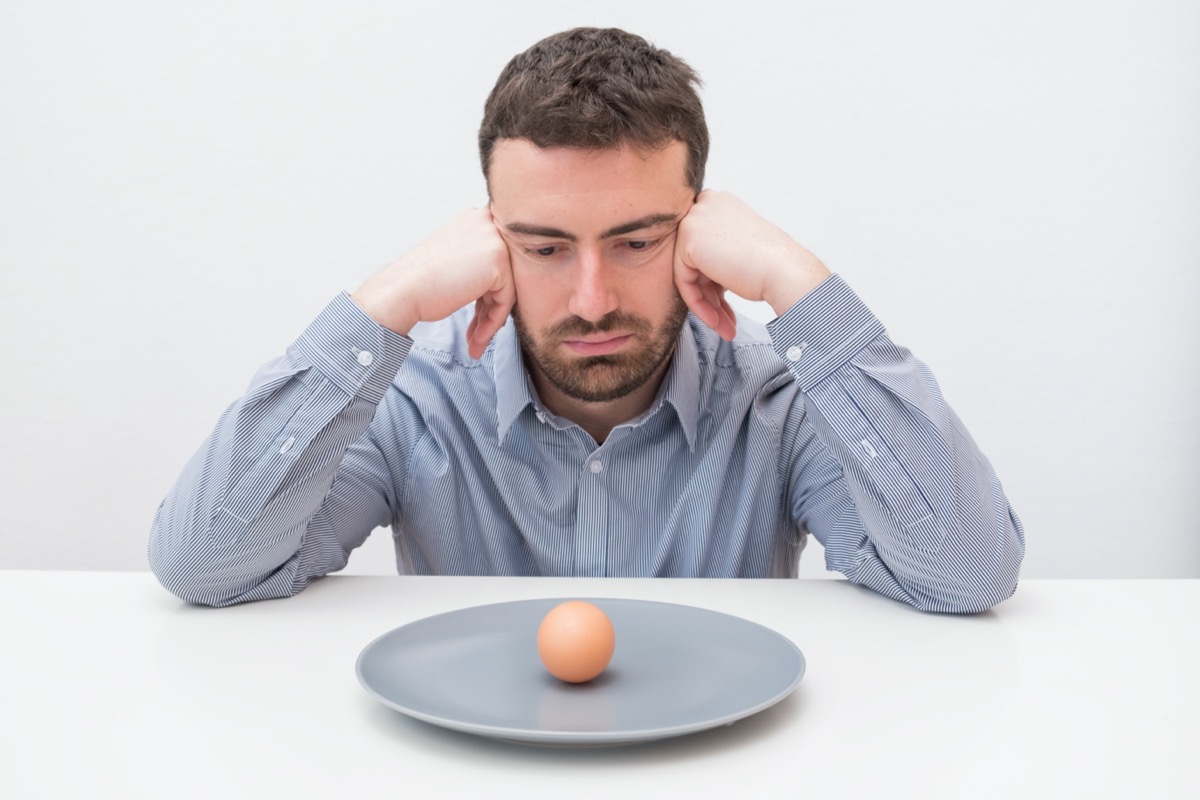
"When it comes to 'health' and nutrition, people are often looking at what food and/or food group they can take out of their diet or eliminate," says Amy Goodson, MS, RD, CSSD, LD. "The challenge with this type of thinking is that anytime you take out a food or food group, you are likely to be taking out a specific set of nutrients as well. In addition, while food restriction might appear to be a short-term solution, it is often hard to sustain over time. The key is to look at what you can add to your diet, like fruits and vegetables. Only 1 in 10 Americans get the recommended amount of fruits and vegetables, which means 90% of people are not eating enough."
Here are 9 Warning Signs You're Not Eating Enough Vegetables.
Instead of restricting food, make a plan with all kinds of foods you love.

Now that we're officially convincing you to break up with dieting, it's time to start being honest with yourself. What are the foods you actually really like—fruits and vegetables included! Allow yourself to eat those foods, incorporate them into your meal plan, and eat them regularly.
"Instead of thinking making eating changes as 'restrictive', it's much more helpful to reframe your food decisions in terms of 'structure' and 'choice'," says Dr. Rachel Paul, PhD, RD, from CollegeNutritionist.com. "You get to choose whichever structure of eating works best for your life and your body. No one knows your body, taste preferences, and lifestyle better than you. You get to choose!"
Stop restricting foods and start treating your body with care.

"As an RD I think people should focus on a couple of different things that will ultimately help them live healthier and eat in a way that's nutritious to their bodies and right for their lifestyle," says Michalczyk. "Some of these include managing stress, prioritizing sleep, finding a type of exercise they like to do, listening to their bodies, and ultimately approaching nutrition choices in a way that combines honoring what they want to eat and making food choices that support long-term health (i.e. eating fruits, veggies, whole grains, seafood, more plants!)."
Here's What Feeling Stressed Every Day Does To Your Body.
Care about the quality of your food.
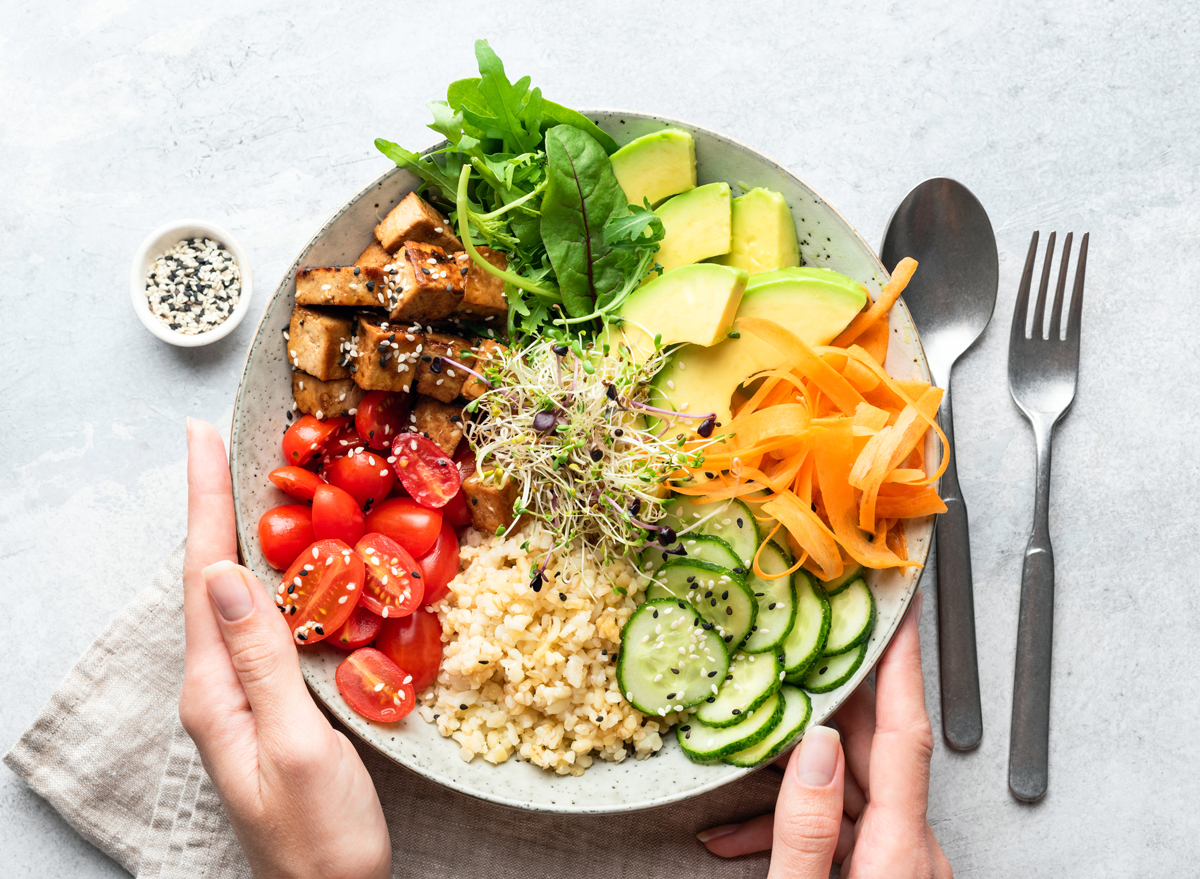
Because you deserve it! Why eat fake "healthy" food that promises a healthier life, when you can have natural nutrients from the real thing?
"Diet culture is the answer to the negative effects of the processed food industry on our health. We've become accustomed to food products rather than real food and it has led to obesity and widespread chronic disease," says Trista Best, RD, a dietitian at Balance One Supplements. "So instead of calling the general population to a diet made of whole foods and less processed ingredients the diet industry has created systems and formulas that temporarily reduce weight based on calorie restriction and unsustainable diet patterns."
"The solution isn't a lower quantity of calories but more quality calories," Best continues. "When we put unsustainable expectations on individuals to lose weight by restricting we are causing them harm both physically and mentally. When the right quality calories are consumed little to no restriction is required to be your healthiest."
But what if you still want to lose weight?

We get it, losing the extra five pounds may be a goal you've had for a while because you're just feeling uncomfortable because of it. The key is to get strategic with your food. Never restrict anything—just portion it out! If you want to eat dessert, what's stopping you from portioning out a bowl of your favorite ice cream?
"The best approach is to personalize your nutrition plan so that you include mainly healthy foods that support your health, help you manage your weight, and can fit into your lifestyle long term," says Brenda Braslow, MS, and MyNetDiary's Registered Dietitian. "Also, finding ways to include favorite treats that you enjoy within an overall healthy approach keeps you from feeling deprived and adds to the enjoyment of foods. Using a calorie tracker can help you figure out how to stay within your calorie or nutrient budget while including your food preferences and slipping in indulgences within your budget."
"Keep in mind moderation, variety, adequacy, and balance, and choose mostly whole foods," says Jinan Banna, PhD, RD. "If you have the basic dietary principles in mind and focus on choosing good quality food, you should not only be able to enjoy your food thoroughly, but you also shouldn't have to think too much about weight. You can also indulge in your chocolate cake and the hamburger you might want to eat sometimes."
So stop restricting yourself and start eating a variety of foods. Think of it as self-care! By eating all kinds of foods, you're giving your body all the different types of nutrients that your body needs.
For even more incredible tips from health experts, check out our list of The Best Healthy Eating Tips For 2021, According to Dietitians.
